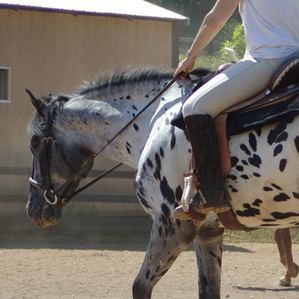My Horse Puts His Tongue Over the Bit
July 10, 2014
Written by: Keith Hosman
Written by: Keith Hosman
|
If your horse has the tendency to put his tongue over the bit, the first thing you need to do is inspect the actual placement of the bit. Look at where the bit naturally hangs in the horse’s mouth. Is it too high, an aggravating “wedgie” that he’s trying to adjust with his tongue? Is it too low? Horses love to play and allowing the bit to hang way down near its front teeth is really asking the animal to flip it around in his or her mouth. Ratcheting it up or down is a simple fix in both cases and you’ll know in minutes if you’ve solved the problem.
Maybe the bit is too narrow for the horse’s mouth? If it doesn’t fit properly, the horse will “fidget” with it just as you would sitting in the cheap seats watching a bad movie. If your horse has the tendency to put his tongue over the bit, here's what to do. 
If you can’t exclude improper fit or placement, ask your vet to take a look. He can easily advise on the fit of the bit – but also check for cuts or sores that might be causing agitation and offer a course of action. If it’s been quite some time since the horse has had dental work done, for instance, he might suggest that the teeth be filed smooth, (“floated”).
If you find that the bit itself (placement, fit, whathaveyou) is not the cause, then you need to start watching the horse closely as you ride. Look specifically for things that happen just seconds before his tongue jumps the bit. You might find that this is something you yourself are causing; maybe you’re pulling too hard or too long or unconsciously jerking on the reins and prompting a negative reaction. Maybe its something as simple as asking for a turn away from the pasture containing his buddies. Keep an objective eye out and play things back in your head. Look for patterns or cues that tend to forecast his tongue getting over that bit. If you believe it might be the way you handle the reins, maybe you’re placing too much pressure – or ceaseless pressure – then teach yourself better feel and timing. Remember, each and every time you pick them up, regardless of how lightly, your horse just wants you to “get out of his mouth.” Ideally, he puts his foot on a particular spot or slows down or whatever and we reward him by immediately dropping our reins. However... should we keep up our pressure, regardless of what the horse does, then we wear out this sensitivity; the horse gets frustrated and quits trying. He learns to ignore you or to protect himself by bracing against your pull and you effectively destroy the connection to your horse’s feet. Our bad habits give our horses bad habits. Break this pattern by counting to five (“one thousand one, one thousand two...”) each time you pick up the reins and then dropping them the instant “five” comes out of your mouth NO MATTER WHAT. When you find yourself missing your goal (of getting the horse to do “A” or “B”) time after time, you’ll quickly teach yourself to make things happen more quickly – and most importantly – to not absent-mindedly hang on those reins. (For instance, how can you motivate the horse to turn or even slow down more quickly? Answer: The moment you get the feeling you’re being ignored, use the same rein you’re holding to turn the horse’s hips to the side. Doing that will both slow and turn your horse. It’s motivation because moving his hips over is more work than simply slowing down or turning as initially asked.)
If you can rule out all the causes outlined above – and your horse still puts his tongue over the bit, then see this as your own cue to put it to work. You never want to jerk on the reins or to punish in some similar way for this; you might very well make things worse. Instead, use an increased workload to motivate the horse. Watch for those telltale warning signs and immediately pick up your pace and pile more on the horse’s plate. Keep your thoughts and actions calm and business-like – we’re not punishing here, we’re just getting a good work out. Sooner or later your horse will start to make the connection: “That’s_ odd, every time I touch the roof of my mouth with my tongue, this guy makes me work harder....” * The preceding was inspired by - not excerpted from - my troubleshooting book "What's Wrong with My Horse?" To see the full contents and read a free sample, click here. |
|

